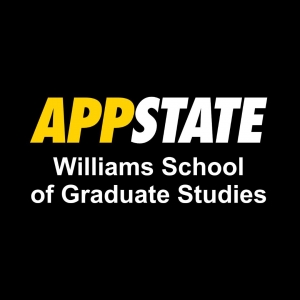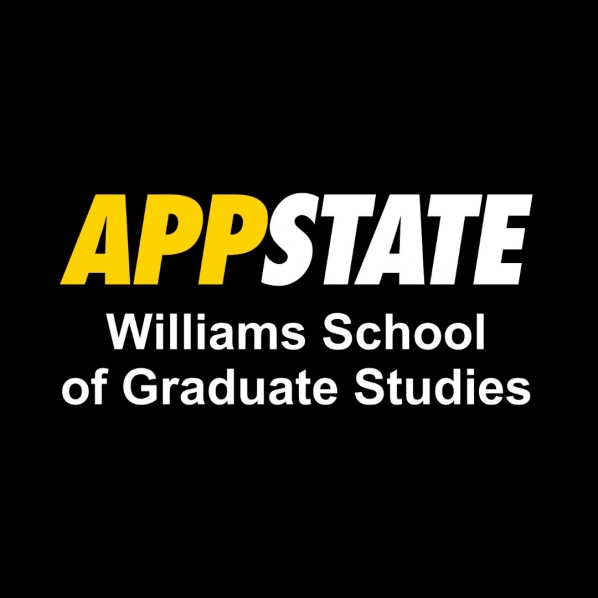BOONE, N.C. — Appalachian State University's Cratis D. Williams School of Graduate Studies has announced the recipients of their 2024-25 awards. The recipients were honored at the Williams School of Graduate Studies awards reception on Tuesday, April 8, 2025.
Students
The Domer Research Award
The Domer Research Award was established by Dr. Judith Domer, dean of the Graduate School from 1997-2004, and her husband Floyd to provide assistance for expenses related to scholarly activities.

Freedom Johnson '22, graduate student in the biology program, received the award for her research on “A Chemical Approach to Gene Detection: Recognition of the clbR Gene in Escherichia coli with Hairpin Polyamide-FRET Conjugates.” Johnson's research was advised by Dr. Rachel Bleich, assistant professor in the Department of Biology.
“My research focuses on designing and synthesizing Hairpin Polyamide-FRET Conjugates (HPFCs) that can selectively bind to specific DNA sequences, such as the clbR gene associated with inflammation-associated colorectal cancer. By incorporating fluorescence resonance energy transfer (FRET) technology, these molecules could provide a non-PCR-based method to detect gene expression with high specificity and sensitivity,” explained Johnson. “Broadly, I am interested in integrating synthetic chemistry, genetics, and molecular biology to synthesize innovative diagnostic tools.”
Johnson's nominators described her as a strong and independent thinker who has found a passion for research and demonstrates great promise as a future research scientist. Johnson's research work aligns with long-term career goals of contributing to molecular diagnostics and synthetic chemistry.
-

Brendan Meckler '23, graduate student in the political science program, received the award for his research on “State Identity as a Social Identity and Potential Determinants.” Meckler's research was advised by Dr. Heather Ondercin, associate professor and political science curriculum coordinator in the Department of Government and Justice Studies.
“My research is primarily on state politics, political behavior, political psychology, and representation,” shared Meckler. “I bring a geographic lens to my political science work, which is what inspired this project. Does identifying as North Carolinian, or as a Texan, for example, make one substantively different from others? In the future, I intend to explore how identifiers with one state compare to state identifiers with another state, and what defines a state.”
Meckler’s nominator described his research as representing a novel contribution to our understanding of how group-based identities shape political behavior with his innovative contribution focusing on state identity. Following graduation, Meckler will pursue his Ph.D. at the University of Iowa.
The Zigli Research Award
The Zigli Research Award was established to support graduate students engaged in research/scholarly activities such as travel related to study, attendance at professional conferences, and/or purchase of supplies or research materials.
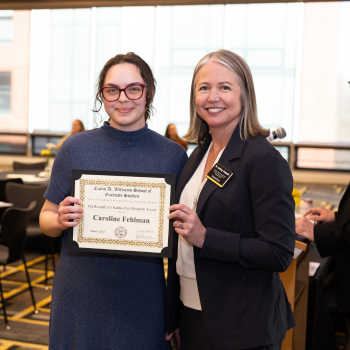
Caroline Fehlman '23, graduate student in the geography and mathematics programs, received the award for her research on “Maternal Healthcare Access Disparities in North Carolina, 2016-2019: A Fine-Scale Geospatial Analysis.” Fehlman's research was advised by Dr. Maggie Sugg, associate professor in the Department of Geography and Planning.
“My thesis focused on using spatial epidemiologic methods to assess geographic access to maternal healthcare providers and its association with severe maternal and infant health outcomes, while taking into account how individual and community covariates influence the relationship,” shared Fehlman. “My research interest includes using spatial and statistical methods for women's health related topics, like maternal health, cancer, and reproductive health.”
Fehlman's nominator described her as “a very bright and motivated student who has a very high potential for making a real impact.” After graduation, Fehlman will pursue her Ph.D. at the University of North Carolina Chapel Hill.
-
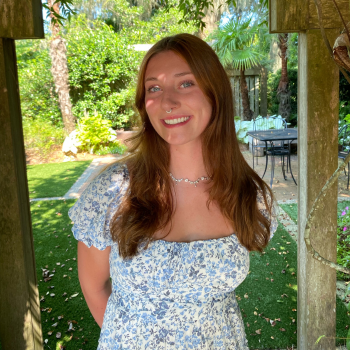
Ally Lawing '23, graduate student in the biology program, received the award for her research on “Co-culture Interactions Between Adherent-Invasive Escherichia coli and Enterococcus faecalis Indicate Increased Biofilm Formation.” Lawing's research was advised by Dr. Rachel Bleich, assistant professor in the Department of Biology.
“My research aims to differentiate microbe interactions in biofilms between Crohn's disease-related Adherent Invasive E. Coli (AIEC) and Inflammatory bowel disease-analogous E. faecalis to understand favorable microbe-microbe interactions that account for their endurance along the inflamed GI tract in patients with IBD. AIEC can prevail in biofilms, which attach to surfaces and are encased in a self-producing exopolysaccharide matrix. In my previous research, a phenotype indicating biofilm formation was seen in co-culture with AIEC and E. faecalis. I am currently observing the expression of genes critical for K-12 E. coli biofilm formation in these co-cultures to understand how E. faecalis impacts this microbial system and biofilm response!” explained Lawing.
Lawing earned this award for her research investigating the interactions between two bacterial species implicated in inflammatory conditions of the human intestine. A nominator described Lawing as “an effective communicator, enthusiastic about research, and a conscientious scientist.”
The Outstanding Thesis Award
The Outstanding Thesis Award recognizes outstanding scholarly activity by students who have completed Master's theses in the previous calendar year. The recognition may be awarded in three categories: 1) social science, business and education, 2) arts and humanities or 3) science and technology.

PJ Coleman '22 '24, alumnus of the biology program, received the award in the science and technology category for his thesis, titled “Syrphidae of the Southern Appalachians: Diversity, Distribution, and Contribution to Pollination Services.” Coleman's research was advised by Dr. Jennifer Geib, associate professor and assistant chair in the Department of Biology.
“Pollination is a critical ecosystem service supporting the vast majority of flowering plants, including many crop species that we depend on for food. When it comes to pollination, most of the buzz surrounds bees; however, many bee species are known to be facing significant global declines,” explained Coleman. “My research is focused on better understanding the diversity, distribution, and foraging choices of pollinating flies in the family Syrphidae (hoverflies) throughout the Southern Appalachians. Specifically, I have conducted a pilot inventory of hoverflies along the Blue Ridge Parkway, described their regional floral associations, and quantified foraging behaviors relevant to their efficacy as pollinators. A stronger focus on hoverflies and non-bee pollinators in general would greatly benefit our natural and agricultural assets, particularly in this age of pollinator peril that we currently find ourselves in.”
Coleman’s nominators stated that his thesis project was incredibly time intensive and represented the work of two theses, but Coleman insisted on the scope of work because he wanted the work to contribute meaningfully to science. A nominator said that Coleman is “an excellent writer...on his thesis he was tenacious and thoughtful...his thesis was incredibly well written and is sure to result in multiple publications.”
Another nominator indicated that Coleman's work on syrphid pollination has “provided hard data supporting their hypothesized importance to regional flora in the Southern Appalachians and will likely be a model for others’ research in the future.”
Coleman graduated with his Master of Science in Biology in August 2024 and is currently a biology lab instructor at Appalachian's Hickory campus.
-
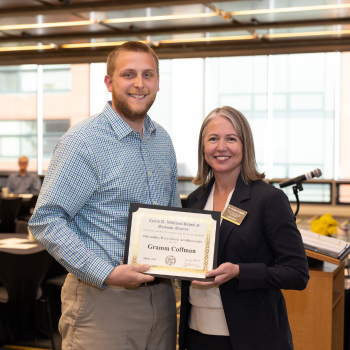
Gramm Coffman '24, alumnus of the history program, received the award in the arts and humanities category for his thesis, titled “Waters of Chaos: The Roles of Rivers and Waterways in North American Warfare.” Coffman's research was advised by Dr. Judkin Browning, I.G. Greer Distinguished Professor in the Department of History.
“My thesis puts the environmental factors of the rivers and waterways of the North American continent as the centerpieces in the conflicts that defined and shaped the continent’s history from the outset of the French and Indian War in 1754 until the conclusion of the American Civil War in 1865,” explained Coffman. “Broken into four themes, my research shows how armies and empires utilized rivers and waterways as avenues for transportation, paths of retreat, military barriers, and as significant aspects in defensive and offensive operations to win control of the continent and forever transform history.”
A nominator described Coffman as “a dedicated and disciplined researcher, who recognizes the value of being able to convey one’s arguments and ideas in clear, graceful prose.” They shared that Coffman's thesis was “one of the clearest and most eloquent master’s theses I’ve had the privilege to read.”
Coffman graduated with his Master of Arts in History in December 2024.
Wachovia Environmental Research Award
The Wachovia Award is designed to recognize faculty or graduate students actively engaged in high-quality environmental research related to the southern Appalachians.
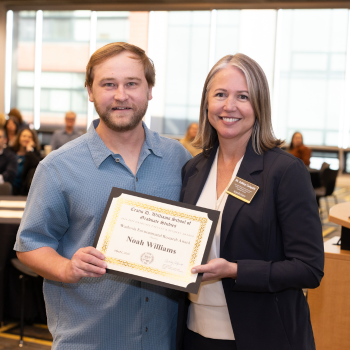
Noah Williams, graduate student in the biology program, received the award for his research on “The Effects of Weather and Land Use on the Growth and Reproductive Parameters of a Population of Eastern Bluebirds.” Williams' research was advised by Dr. Lynn Siefferman, professor and graduate program director in the Department of Biology.
“One of the main goals of my project was to use long-term data, in this case 15 years worth of data, to figure out how global climate change is impacting avian species in our area. From this, we can deduce how global climate change may be impacting other, non-avian species in our area, but also species in areas with similar climates,” explained Williams. “This research adds an additional insight because it incorporates extreme weather, weather during the winter, weather during the summer breeding season, and also land usage to gauge how population dynamics may be influenced by these things. This is especially important as weather events become more extreme and as land use continues to be altered in our area.”
He added, “Eastern Bluebirds are a common species, but at one point during the early 1900's their populations were severely declined and their recovery is considered a major conservation success. So to learn more about how this and all species are going to be impacted by human actions is very important in order to preserve the beautiful ecosystems of our area.”
Three Minute Thesis Competition
During the ceremony, the winners of the School of Graduate Studies' Spring 2025 Three Minute Thesis competition, one from CAS, were also recognized.
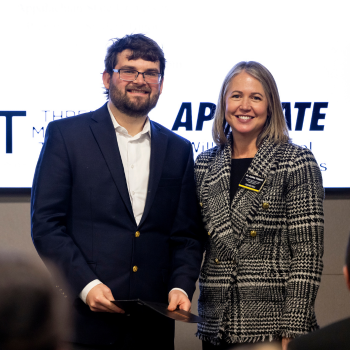
Steven Vogel, graduate student in the industrial-organizational psychology and human resource management program, received the People's Choice Award for his presentation on his thesis, titled, “Performing on the Glass Stage: Examining Role Congruity’s Effect on Firm Performance.” Vogel's thesis was advised by Dr. Tiberiu Ungureanu, assistant professor in the Department of Management in the Walker College of Business
Faculty
100 Scholars Award
The 100 Scholars Research Award is designed to recognize exemplary research or creative activities of a tenured faculty member. The recipient will be a senior faculty member performing well above the standard level of faculty research within the last five years.

The recipient of the 2025 100 Scholars Award is Dr. Rachel Smith, professor in the Department of Physics and Astronomy. In addition to her role at App State, Dr. Smith serves as the Head of the Astronomy and Astrophysics Research Laboratory and Curator of Meteorites at the North Carolina Museum of Natural Sciences and an adjunct instructor in the Department of Physics and Astronomy at the University of North Carolina at Chapel Hill.
Smith holds a Ph.D. in geochemistry from the University of California Los Angeles. Her research interests include early solar system chemistry, chemistry of forming planetary systems in the galaxy, solar system evolution and planet formation, life in the university and the origin of life.
Smith's nominators noted that she is an extraordinarily productive and accomplished researcher. She has continued to successfully secure external funding, with an astounding 38 externally funded proposals over the past 13 years. Smith has secured millions of dollars in research funding, including attracting highly competitive funding awards from NASA and other sources. Her scholarly output is equally impressive, with over 70 peer-reviewed papers, conference proceedings and magazine articles published since she joined App State. In addition, Smith has been featured in film, radio and television as a guest scientist, further extending the reach of her expertise.
Smith’s current project on young stars, titled “Observations of Forming Stars: Placing the Solar System into a Galactic Context,” explores the chemical pathways that could lead to worlds like Earth and the molecules needed for life. Smith’s research is important to her as she feels we do not fully understand our deep past, or if any worlds like ours could be out there, and researching these great mysteries is the most fascinating work she can imagine.
According to Smith's nominators, she also loves spending time with her donkeys, horses, goats, chickens and other creatures, who are wonderful company while she thinks about the stars and life in the Universe.
Academy of Outstanding Mentors
The Academy of Outstanding Graduate Mentors was established to recognize graduate faculty members for exemplary mentoring activities well beyond good classroom and laboratory instruction or research supervision of graduate students.
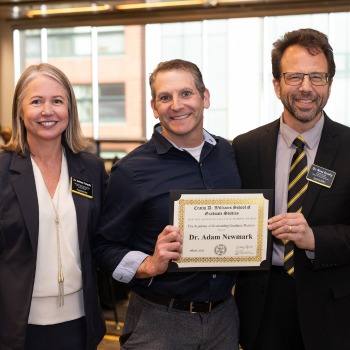
Dr. Adam Newmark, professor of political science in the Department of Government and Justice Studies, was one of three faculty members selected for induction into the 2025 Academy of Outstanding Mentors. Dr. Newmark holds a Ph.D. in American government from the University of North Carolina at Chapel Hill. He joined the Department of Government and Justice Studies in 2004.
Newmark’s nominator stated what truly sets Newmark apart is his “deep and genuine concern for his students’ personal and professional development, as he recognizes that graduate education is about more than academic success - it is about preparing students for the complexities of the professional world, and Dr. Newmark goes above and beyond to support his students in this preparation.”
Newmark shared that the most enjoyable part of his work with graduate students is the thrill of seeing his first batch of former students thrive and succeed in their careers in government, on campaigns, in the private sector, and in academia. He mentioned that some of those students are now professors at other universities who are continuing the training of a few of Newmark’s more recent graduate students, so Newmark guesses that makes him a “grandfather”!
Outside of academics, Newmark enjoys traveling and has ventured to Peru and Iceland, and, most recently, visited the Australian Outback and snorkeled the Great Barrier Reef.
Distinguished Graduate Faculty Award
The Distinguished Graduate Faculty Award is designed to recognize a faculty member who is engaged in the graduate education enterprise as an outstanding teacher, mentor, and scholar.
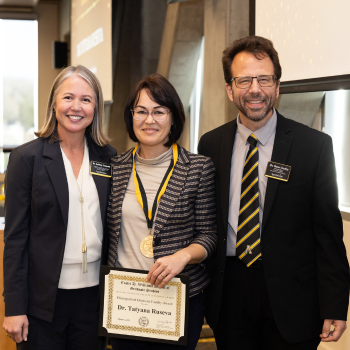
The recipient of the 2025 Distinguished Graduate Faculty Award is Dr. Tatyana Ruseva, professor of political science in the Department of Government and Justice Studies. Dr. Ruseva holds a Ph.D. in public affairs from Indiana University. She joined the Department of Government and Justice Studies in 2011.
Ruseva's nominator noted her “transformative” mentorship, leading to her students appearing as co-authors for journal articles in top-tier journals; and her teaching, which challenges students to engage deeply with the complexities of environmental governance, policy analysis, and sustainable development, equipping them with both theoretical knowledge and applied skills essential for professional and academic success.
Dr. Cathy Marcum, chair of the Department of Government and Justice Studies, described Ruseva as a “champion” for her students, who mentors them in teaching and in research, while maintaining a strong record of publication and securing external funding. Dr. Marcum also noted that Ruseva’s “contribution to this department as a scholar and a colleague is difficult to quantify, as she does so much.”
Ruseva indicated that the most enjoyable part of her work with graduate students has been seeing their growth. She said, “It's a unique and rewarding experience to see the personal and academic/skill-based growth in a fairly short period of time - it is as if you have planted seeds in the spring and are enjoying the fruits of your labor in the fall.”
###
About Graduate Education at App State
Appalachian State University’s Williams School of Graduate Studies helps individuals reach the next level in their career advancement and preparedness. The school offers 80 graduate degree and certificate programs — both in person and online — in a range of disciplines, including doctoral programs in education (Ed.D.) and psychology (Psy.D.). The graduate school enrolls nearly 2,000 students. Learn more at graduate.appstate.edu.
By Lauren Gibbs
May 5, 2025
BOONE, N.C.
